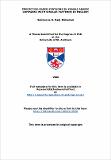Predictive-based syntagms in Kamali Arabic compared with similar patterns in English
Abstract
The present work is mainly concerned with the syntactic
structures of the predicative-based syntagms in I4amali Arabic. The
constituents within these syntagms are further analysed until the relations
between pleremes (i. E. the minimal syntactic entities) are arrived
at. It also offers description of similar structures in English,
and brief comparisons between the structures of the two languages in
question.
Linguistic description has been defined as "the application
of a particular linguistic theory to a selected field of linguistic
phenomena". (Mulder 1975). The theory applied in this work, to both
English and Kamali Arabic, is Mulder$s axiomatic functionalist approach
to syntax.
This thesis falls into four parts. The first part is divided
into two chapters the first of which offers a brief introduction to the
basic principles of axiomatic functionalism, and to the relations between
linguistic theory, linguistic descriptions and the speech phenomena;
and the second provides explanations to the essential notions in syntax.
The second part, dealing with syntactic relations in Kamali
Arabic, comprises three chapters. Chapter I is concerned with the
verbal, and non-verbal, predicative-based syntagms, chapter II with
the functional syntagms, and chapter III with the nominal syntagms.
The third part, dealing with syntactic relations in English,
comprises four chapters. Chapter I deals with the verbal predicative-based
syntagms, chapter II With the copulative predicative, III with
functionals, and IV with nominals.
The fourth part, offering comparisons between English and
Kamali Arabic, is divided into three chapters. Chapter I offers
comparisons between the predicative-based syntagms, and between their
constituents. Chapter II between functionals, and III between nominals.
Type
Thesis, PhD Doctor of Philosophy
Collections
Items in the St Andrews Research Repository are protected by copyright, with all rights reserved, unless otherwise indicated.

